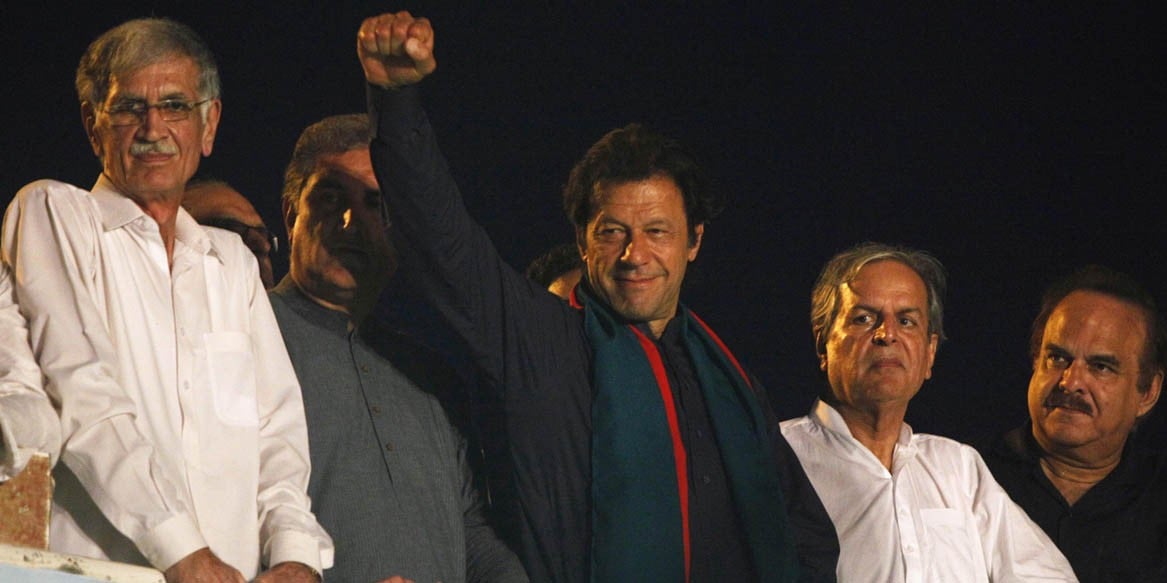
The monologue of dharna and its disdain for political processes will be deadening for our collective political lives

Otto von Bismarck, in 1867, defined politics as "the art of the possible".
Bismarck was famous for handling multilateral negotiations and maintaining peace between powerful states of his era. He is also generally credited for having created the first modern welfare state that championed the rights of the working classes as a means of strengthening the industry and consequently the national economy.
The people of Pakistan are witnessing a strange, and very insidious, disregard for this art of the possible in the form of the dharnas in Islamabad.
Holding all the usual elements of political processes -- building a body of cadres, mobilising communities, negotiating with the existing power structures, bargaining, and making alliances, consolidating -- in abeyance, two simulators of "revolution" and "freedom" have occupied the centre-stage in the name of ‘revolution’ and ‘freedom’.
‘Freedom’ and ‘revolution’ have never been used so casually before in the history of Pakistan.
This is perhaps the first time when two political parties have shown such disdain for the ordinary people of Pakistan. Even Jamaat-e-Islami bothers with building its network of cadres, maintains membership rosters, and has its internal structure modeled after the Communist Party of the former Soviet Union.
Basically both the PTI and PAT are anti-political and anti-people parties and the majority of the people of Pakistan have rejected their televisual hysteria and simulations of freedom. Their disdain for the political processes is obvious: they are issuing demands that will basically undermine democracy in the long-term.
Let’s keep the whole issue of gerrymandering/rigging aside for a while because this issue itself delegitimises the choices the people of Pakistan have already made."
This is a tried and tested way of making the ordinary people irrelevant. Even Zia ul Haq used to be interested in something called ‘real’ democracy.The only democracy that is real is the one which exists without the interference of the deep state.
Therefore, those who have come with the help of the deep state or those who have no constituency should not even be teaching the fine differences between sham and real democracy. Qadri has no stakes in the system and Imran Khan should become democratic, in the real sense, towards the elected president of his party.
Because of the nature of the demands they are making of the system, these dharnas are anti-people and anti-political. Let us analyse the basic demands of these simulations of protests.
The first and the most vocal demand from both the parties is the resignation of an elected prime minister. This demand is not constitutional because the demand is being articulated not inside the parliament but outside it.
The reason for making this demand outside the parliament is obvious -- people have not voted for these two parties.
These parties are trying to usurp the political power that has not been given to them by the people of Pakistan in the first place. Therefore, they have to use moral vocabulary. The present rulers are corrupt. Even if the present rulers were corrupt, the process of removing them should be constitutional and political not Machiavellian.
The second demand made by the dharna-wielders is even more dangerous for the people of Pakistan. It is the demand for the establishment of a technocrat government. It is the demand that lays bare the fascism that lurks in the hearts of Imran and Qadri.
Pakistan is not a multinational firm that should be run by a board of technocrats being guided by a CEO.
This demand differentiates Imran Khan and Tahirul Qadri from the demands of the people. The people do not know how to interact with technocrats at all. Why are both the PTI and PAT so impatient with the parliament? It seems that both these parties do not want to be answerable to the people the way parliamentarians have to be.
What will be the way for making the technocrats accountable? We do not know.
This demand is similar to one of the 25 demands made by the Nazi party in Germany in 1920. The Nazi party demanded the establishment of a "strong central authority" which will have "unrestricted freedom" in order to "ensure that the laws promulgated by the central authority shall be carried out by the federal states." To have their demands accepted, the Nazi leaders pledged: "The leaders of the party undertake to promote the execution of the foregoing points at all costs, if necessary at the sacrifice of their own lives."
It is this implacability of their demands and their sense of entitlement of the right to demand despite the absence of a political mandate that make Imran Khan and Tahirul Qadri new iterations of fascism in the age of the media.
Both of them have cloaked their anti-people demands in moral and technocratic vocabulary and if they succeed, it will be the death of the will of a people.
The people are not perfect enough to meet their demands. The people are messy. They bargain. They modify themselves and create new alliances and find new ways of resisting the structures that oppress them. An imperfect people should have imperfect leaders who sin with them and are not seduced by the false promises of a deadening technocratic rationality.
Let us please remain a messy people. We do not want to be perfected because we know how the promises of perfection have already produced Hitler, Mussolini, and Pinochet in power.
We deserve to remain imperfect because imperfection makes us have dialogue. Our messy lives will have nothing to talk about if we perfect ourselves. The monologue of the dharna and its disdain for political processes will be deadening for our collective political lives.